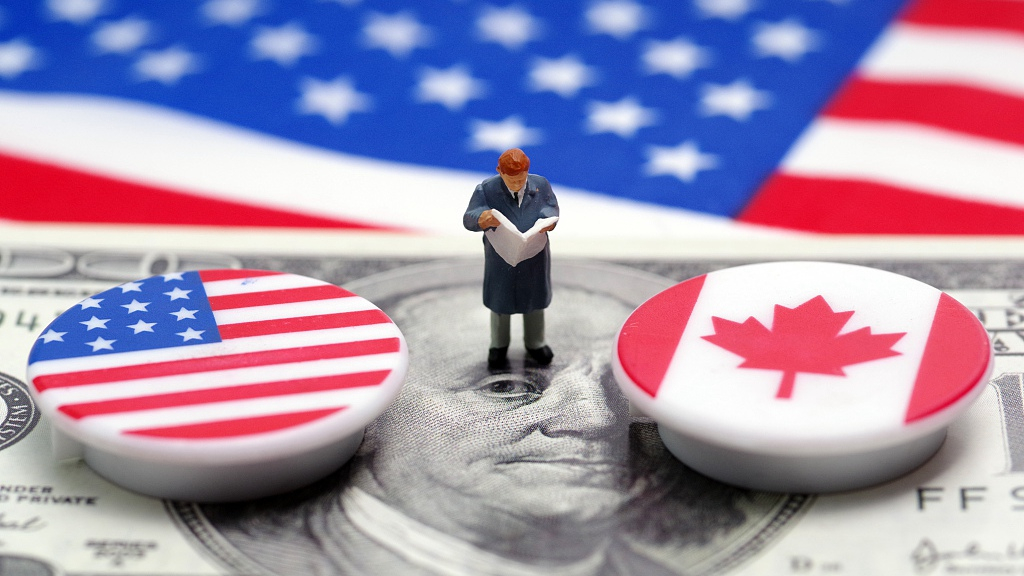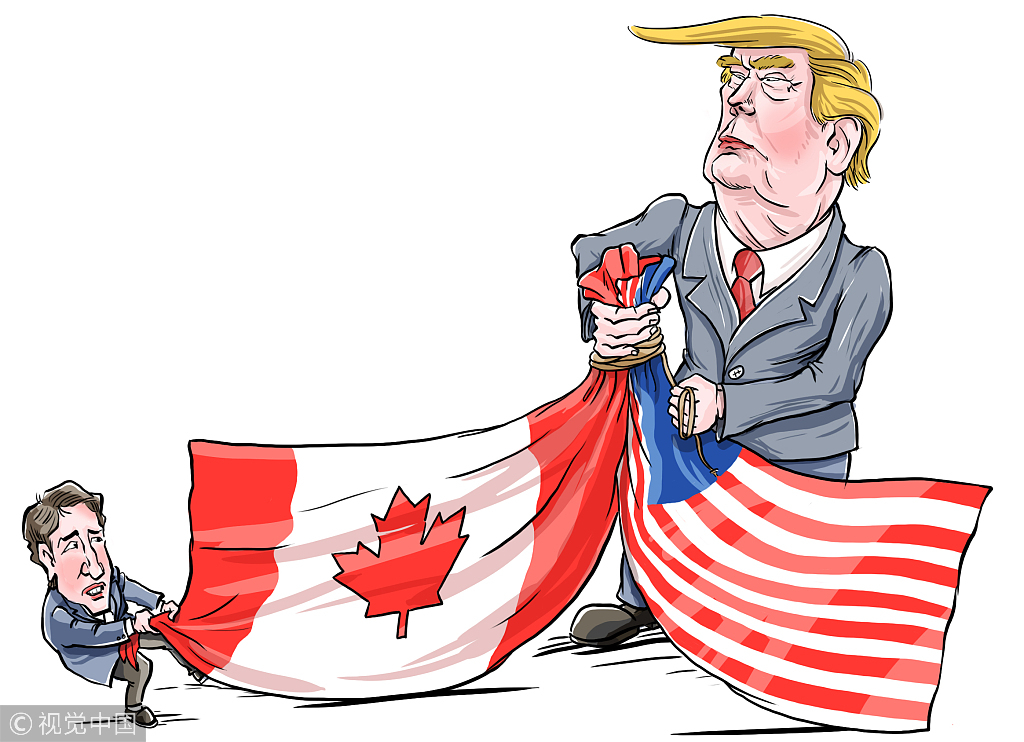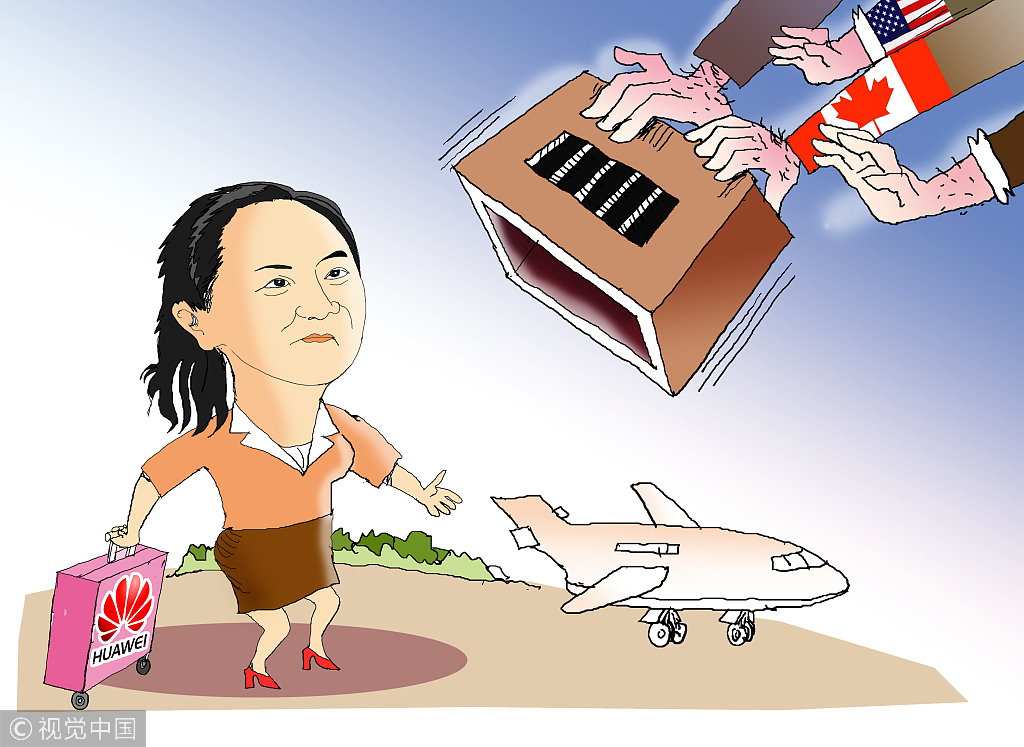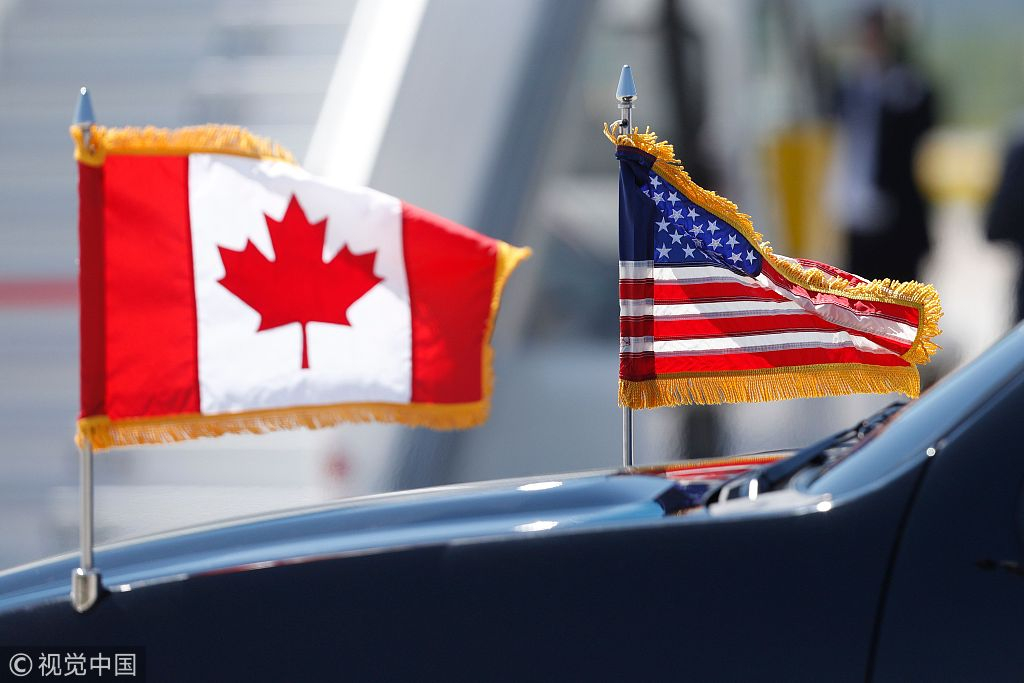
Opinion
11:02, 18-Mar-2019
Canada is also a victim of U.S. extraterritoriality
Ken Moak

Editor's note: Ken Moak, who taught economic theory, public policy and globalization at the university level for 33 years, co-authored a book titled "China's Economic Rise and Its Global Impact" in 2015. The article reflects the author's opinion, and not necessarily the views of CGTN.
Canada is both blessed and cursed for having the U.S. as its neighbor and ally. American investment is undeniably the biggest booster of Canadian economic growth, making the country what it is today: a developed and rich nation. The cost, however, has been extremely high, culminating in Canada surrendering its economic and geopolitical sovereignty and subjecting it to U.S. extraterritoriality.
American economic dominance over Canada began before Confederation in 1867 when its prime minister, John A. MacDonald, implemented the National Policy with the tariff as its cornerstone. The thinking was imposing 33-percent duty would protect infant Canadian import-substitute industries from the more mature foreign enterprises, particularly those of the United States.

Canada is economically dependent on the United States. /VCG Photo
Canada is economically dependent on the United States. /VCG Photo
Instead of paying the tariffs, American enterprises came into Canada through the "backdoor," investing in manufacturing and resource industries. Unable to compete with the more technologically advanced, powerful and richer U.S. firms, Canadian enterprises were unable to grow and relegated into a state of inefficiency.
Today, the U.S. is the country's biggest trade partner, buying over 75 percent of Canadian exports (mostly produced by U.S.-owned firms). America is also Canada's largest foreign investor, owning more than 50 percent of Canadian corporate assets.
Indeed, major Canadian industries, from auto manufacturing (i.e. General Motors) to retailing (Walmart), are dominated by U.S. enterprises, making the joke "when the U.S. sneezes, Canada catches pneumonia" a truism. That is, Canada has turned into a "branch" of the United States.
Effects of being a 'branch' of U.S. economy
As a "branch" of the U.S. economy, Canada has paid a very high price, limiting its economic prospects, as major decisions of foreign investors are made at the U.S.-located headquarters.
For example, General Motors shutting down its Canadian operations was a head office decision to restructure the company, making it more profitable and in line with future demands. But that decision put thousands of Canadian auto and related workers on the unemployment line.
The auto industry has a massive multiplier effect, from steel manufacturing to dealership, thus closing down operations would affect them too.
Further, the U.S.-Canada "branch economy relationship" has "truncated" the economy, limiting Canada's research and development activities and trading opportunities. Major U.S. enterprises not only prohibit their Canadian subsidiaries from carrying out R&D, but also demand the latter to pay for the cost of the activities in America. Under U.S. government pressure, Canadian-located American manufactures were barred from trading with Cuba.

Huawei CFO Meng Wanzhou was arrested in Vancouver at the request of Washington. /VCG Photo
Huawei CFO Meng Wanzhou was arrested in Vancouver at the request of Washington. /VCG Photo
In short, the U.S. is "choking" Canada's economy and polity, prompting successive Canadian governments, particularly Liberal, to diversify their economic relationship and walk a more independent geopolitical path. Jean Chretien was the first Liberal prime minister to lead large delegations to China. Paul Martin followed suit. The Justin Trudeau government is no exception and, in fact, has made it a priority to establish a free trade agreement (FTA) with China.
However, the desire to forge a close trade and investment relationship with China was again derailed by the U.S. with the arrest of Chinese high-technology conglomerate Huawei's chief financial officer, Meng Wanzhou and the signing of the U.S.-Mexico-Canada Agreement, a replacement for the existing North America Free Trade Agreement.
Arresting Ms. Meng sunk Sino-Canadian relations to a new low, not seen since Stephen Harper was elected prime minister. Shortly after assuming office, he accused China of stealing Canadian technological secrets, probably in reference to a Chinese-made mobile phone that looked similar to Canada's Blackberry. Harper also vowed not to "sell Canadian values for the almighty dollar," a statement interpreted as a signal to downgrade the Sino-Canadian relationship.
However, Harper made a "U-turn" on Sino-Canadian trade and investment relations in 2012, but only because the economy was slowing down and after pressure from the business community. In that year, the two countries completed negotiations on many deals that were in the making for over 20 years, illustrating how important China could be to Canada.
Section 32.10 of the United States-Mexico-Canada Agreement (USMCA) stipulates a trade partner must inform the others if it intends to form an FTA with a "non-market" economy and the latter (U.S.) have the right to terminate the agreement was meant to bar Canada from doing business with China. Because of its reliance on the U.S. economy, the threat would likely be enough to discourage any Canadian government from establishing a trade relationship with the Asian giant, at least in the foreseeable future.
U.S. 'imperial' reach extends to geopolitical realm
U.S. territoriality has extended to the geopolitical realm as well. For example, Canada along with the UK and France joining the U.S. in its "freedom of navigation operations" in the South China Sea can be construed as act of extraterritoriality. The waterway is over 10,000 kilometers from Canadian (British and French) shores.

Canada is a victim of U.S. extraterritoriality. /VCG Photo
Canada is a victim of U.S. extraterritoriality. /VCG Photo
What's more, China has not shown in any shape or form that it threatens Canadian (British and French) national security. Besides, why would the three want to irk China unnecessarily? They want rapprochement with China to boost their economic well-being after all.
Canada, of course, is not the only ally that is a victim of U.S. extraterritoriality. The U.S. has threatened reprisals against its Oceanic, Asian and European allies should they allow Huawei equipment to be installed in their 5G network.
Italy is being chastised for joining the China-proposed Belt and Road Initiative. European Union countries such as Germany are being threatened with U.S. sanctions for going ahead with the Nord Stream Two pipeline, buying Russia natural gas instead of the more expensive U.S. product.
U.S. imposing extraterritoriality on other countries has existed since the World War Two, but not as blatant as under President Donald Trump. He (and his senior officials) openly demand friends and foes to toe the American line and threatens reprisals if they do not. For example, the U.S. under Trump has demanded China give up its development architecture and threatened to impose tariffs on all Chinese-made goods if it doesn't.
U.S. extraterritoriality has cost its allies and foes hugely. However, the problem of bullying friends might turn them into foes, as some European nations are beginning to oppose the world's only superpower. For example, Germany and other EU nations are defying U.S. pressure on banning Huawei from their 5G network and not sending ships to provoke Russia.
(If you want to contribute and have specific expertise, please contact us at opinions@cgtn.com.)

SITEMAP
Copyright © 2018 CGTN. Beijing ICP prepared NO.16065310-3
Copyright © 2018 CGTN. Beijing ICP prepared NO.16065310-3